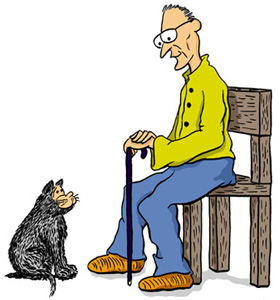
William Burroughs and Friend
Some people say that William Burroughs was the greatest writer that ever lived. After all, here was a man who was a leader of "The Beat Generation", a friend of Jack Kerouac and Allen Ginsberg, a man whose novel "Naked Lunch" helped break literature out of its traditional forms and removed the final barriers of censorship in America. Of course, others say his writing is absolute nonsense, and if there was a man who represented all that was negative and destructive of his generation, it was Bill Burroughs.
Bill probably wouldn't have argued with that last assessment, but he still appreciated the acclaim his writings brought him. Today his books still sell as well as they did when they were banned, and they keep pulling in enough for publishers to keep them in print.
But if anyone wants to look to the life of Bill Burroughs as a roadmap to achieving literary renown you might want to think it over before trying it out. Certainly Bill himself had second thoughts, and in his last years he was asked if he regretted anything he did. Sure, he said, everything.
Bill was born in St. Louis in 1914 where his grandfather had invented the adding machine. Although the family firm ultimately developed into the megalithic Burroughs Corporation, Bill's own parents weren't really a part of it. But Bill's father did own a good chunk of the Burroughs stock and was fortunate enough sell out a month or so before the 1929 crash. The money from this, plus the income from a gift and art shop, meant Bill's background was one of high prosperity, if not fantastic wealth.
Bill was a thin, sickly-looking kid, and his parents packed him off to New Mexico to attend the Los Alamos Ranch School. This was the same Los Alamos that was later bought by the federal government when they needed a place to build the atomic bomb. At the time, though, it was a fancy private school that was supposed to take the soft and pampered scions of rich families and build them up into hard-muscled and vigorous youths capable of taking over the family business. The curriculum emphasized outdoor exercise which, except for firearm training, Bill detested. But Bill did hone his already-impressive shooting skills, and this training, together with his love of detective stories, increased his infatuation with guns, violence, and crime.
It was also at Los Alamos that Bill first experimented with drugs. Reading about the effects of chloral hydrate - the "Mickey Finn" of the detective stories - Bill bought some and when he tried it out almost killed himself. Rather than learn from the experience he later developed an addiction/cure cycle that stayed with him well into his later years and which totally defined his personality.
After prep school, Bill entered Harvard. Although he didn't particularly like college, he seems to have been a diligent student and acquired an impressive literary knowledge. When he left Harvard in 1936, he had picked up a few new friends, a degree in English literature, and a $200 a month allowance from his parents.
The allowance was good money at the time, but Bill worked at other jobs as well. About the only one he seemed to like was being an exterminator in Chicago. This was the last steady job he ever had, and after eight months of killing bugs, he moved to New York City. He worked briefly at an advertising agency, but he soon quit, and afterwards he mostly hung around with two friends he had known in St. Louis: David Kammerer and Lucien Carr.
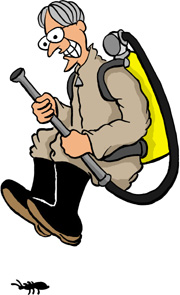
Bill's last steady job
Lucien, like Bill, hailed from a prosperous family, and a sizeable chunk of his younger days were spent moving from school to school. In part this was because Lucien had a natural fecklessness which didn't endear him to the schools' administration. But it was also to get away from David, Bill's other St. Louis friend.
The story that David was Lucien's scoutmaster, although a good tale, doesn't appear to be true. But David had been a supervisor at one of Lucien's prep schools where he had taken a more than professional interest in the younger man. Once Lucien started his school-hopping career, David would follow him from town to town, taking odd jobs to support himself.
Lucien's decision to transfer to Columbia University in 1942 was prompted less by a desire for academic excellence than it was to get away from David. But when Lucien moved to New York, sure enough, David followed along. Oddly enough, the two remained on good terms despite the fact that Lucien always rebuffed any moves on David's part. But still they'd drink and socialize together, and with the others in their Columbia bunch, sit around and discuss literature, classical music, and such things.
Hanging around with Lucien brought both Bill and David into contact with a number of the college's more raffish set. Soon Bill was introduced to a rugged-looking college drop-out named Jack Kerouac. Jack had attended Columbia on a football scholarship, but his heart hadn't been in it. He wanted to be a writer, and he was serious about it. When he wasn't drinking, partying, or discussing literature, he wrote.
There was, of course, a war on. With his athletic ability and near perfect health, there was no way Jack could avoid the draft. In any case, he was and remained a man of traditional patriotic values, and he enlisted in the Navy. He soon found he was as ill fitted for the Armed Services as he was for college, and he managed to get himself diagnosed as schizophrenic. When that didn't get him an immediate discharge, he ran naked across the parade ground shouting "Geronimo!" just as a group of high level officers were passing through. Soon he was back in New York City.

Jack Kerouac at Boot Camp
Because writing as yet unpublished books didn't pay the rent any more than drinking or partying, Jack worked at various jobs which ranged from selling phone books to writing script scenarios for Columbia pictures. But his most steady work was as a merchant seaman, which actually wasn't very steady work. Fortunately, his girlfriend, Edie Parker, also had a job, and besides, her parents were rich. Later Jack began roaming the country and sponging off his friends, bumming their food, booze, and cigarettes until they got sick of him. He wrote up his wanderings, suitably embellished, as "On the Road", and ultimately the book made him rich and famous. Then at the peak of his fame, he moved back with his mother.
Another and far more important friendship that Bill cultivated through Lucien was that of a seventeen-year-old and, at the time, rather naive native of Paterson, New Jersey. This was, of course, Allen Ginsberg. Allen came from a background that was a mixture of middle class stability and over-the-edge craziness. His father, Louis, was a teacher, a published poet, and like many of the socially conscious citizens in the early twentieth century, a socialist. The relationship between father and son was good, but Louis worried about Allen. Although an excellent student, Allen was not, as he himself realized, a particularly practical person. Louis wanted Allen to become a labor lawyer to help the poor and downtrotten, but soon Louis found Allen really wanted to write poetry. He couldn't very well criticize his son for that, but he did tell Allen to write poetry only if he couldn't help it.
Allen's mother, Naomi, was even more left-leaning than her husband and considered herself a full-blown communist. But Allen's home life was not dictated by his parents' politics or his own literary aspirations, but rather by his mother's mental instability. While Allen was still young Naomi became certifiably insane, believing Louis and others were plotting against her and that she had wires implanted in her head. She finally had to be institutionalized and was able to make only brief visits back home during the remainder of her life.
The Columbia crowd that was centered around Bill, Lucien, David, Jack, and Allen grew and developed into what has since been labeled "The Beat Generation". Jack actually coined the term, and even at that early stage, they regarded themselves a unique group of talented and original individuals who would do great things in the world of literature (even if the did say so themselves). But at that time, they mostly did what college kids and their dropout friends have always done. They hung around with their friends, partied, someetimes went to class, talked, and in general, had as good a time as possible.
All this might have gone on until they all grew up and had to go their separate ways. But one night after drinking in a local bar, Lucien went out to get a breath of fresh air. He walked over to Riverside Park, and naturally David came along. Fired by liquor and irritated by Lucien's continual rebuffs, David suddenly professed his passion for Lucien, and somewhat paradoxically, threatened to kill him. He then threw himself upon the slighter man. This scared Lucien so bad he pulled out his Boy Scout knife, and before either of them knew what happened, David was laying silent, still, and quite lifeless.
Lucien panicked. He removed David's shoelaces, tied him up (hopefully he remembered the right knots), and after stuffing stones gathered from the riverside into David's pockets, he rolled David down the bank and into the Hudson.
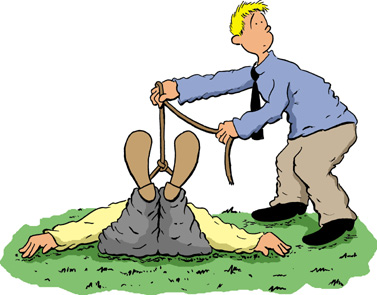
Lucien and David in Riverside Park
Almost immediately Lucien realized that was a pretty dumb thing to do. So he went to Bill Burroughs. Bill told him the killing was clearly self-defense, and he should have his family get a good lawyer and turn himself in. Lucien still hesitated and went to Jack Kerouac. Although Jack helped Lucien get rid of the knife, he told Lucien the same thing.
After two days, Lucien finally did give himself up. Or rather, he tried to. The police hadn't heard anything about any unaccounted dead people floating down the Hudson and didn't believe him. But when the Coast Guard finally DID find David, rather the worse for wear, the police realized the baby-faced kid from Columbia wasn't joking. Lucien was charged with murder, and the police, to atone for their previous laxness, also arrested Bill and Jack.

Lucien turns himself in.
As is typical of well-to-do young people who profess independence and get into trouble, Bill called Mama and Daddy. Papa Burroughs flew to New York, put up the bail, and then both of them flew back home to St. Louis. Jack's father, on the other hand, refused to have anything to do with a son who was involved, however tangentially, in a murder. So naturally Jack had to turn to Edie for the money. But since Jack had a tendency to spend her money as well as his own, Edie didn't have much left for bail. So she went to HER parents.
Naturally, they weren't too happy about putting up bail money for their daughter's boyfriend, especially since she and Jack had "set up housekeeping" so to speak without being married. In a decision Edie's father certainly later regretted, he agreed to put up the money. But ONLY, he said, if Edie and Jack got married. So following a brief jailhouse ceremony, the money was forwarded and Jack got out. Jack and Edie split up after a couple of months, but neither Bill nor Jack ever had to go to court.
Lucien wasn't so lucky; he was slapped with a maximum of twenty years. Although this sounds like a pretty stiff sentence for what was clearly self-defense followed by a panic attack, it really was intended to be a test of Lucien's character. If he was a good boy it was understood he'd get out reasonably soon. In the end he spent nineteen months at the Elmira Reformatory in upstate New York.
Bill returned to New York City, but didn't have much to do. Under the guise of carrying out an "anthropological study", he began associating with petty thieves, drug addicts, and the other small time crooks that hung around Times Square. With his new found friends Bill began to take drugs in earnest. This ate into his $200 a month allowance, and Bill got more and more involved in the small-time underworld to finance his habit. Although he would stoop as low as rolling drunks, he mostly acted as a middleman for the thieves and pushers who needed a place to store and peddle their booty. But that was easily enough have him criminally involved in the eyes of the law
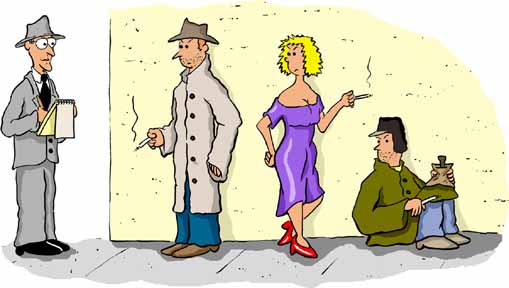
Anthropology 101 in New York City.
Although Bill was renting a room of his own, he had actually moved in with Joan Vollmer, a Columbia journalism student. Her first meeting with Bill had actually been a set-up by his friends. Thinking Joan and Bill were a lot alike (which lamentably they were), Jack and the others thought they'd make a fine pair. Joan and Bill did get along great, particularly since she had a greater propensity for drugs than Bill.
Joan's favorite was Benzedrine. At that time, despite a rash of early century legislation, you could still get drugs fairly easily. Benzedrine, in particular, was available in the form of over-the-counter inhalers used to combat the drip-drip-drip of nasal congestion. It wasn't until 1959 that these favors were banned, but in the 1940's you could get them in any drugstore. You'd pop open the inhaler and eat the Benzedrine blotter inside. Although it tasted terrible and it was hard to keep from throwing up, it was relatively cheap, and soon Joan was totally addicted.
Eventually the whole bunch (minus Lucien) ended up in living in Joan's apartment (which was huge). Even Allen Ginsberg, despite his straight-A's, had managed to get kicked out of Columbia and moved in. Which meant things were almost the same as before.
Almost, that is. With Bill's criminal doings, things couldn't keep going indefinitely, and finally, someone tipped off the police. Herbert Huncke, one of the more literary of Bill's hoodlum friends, was arrested for drugs right in Bill's room. This would have been bad enough even if Bill was an innocent by-stander. Unfortunately, the police also found a number of falsified drug prescriptions signed by (Dr.) Bill Burroughs. So both Bill and Herbert were hauled off to jail.
Once again Bill's dad flew to New York and bailed him out. Today Bill would have probably gotten jail time, but the mid-1940's were before the mandatory sentence and zero-tolerance mentality really set in. Besides, Bill's folks were rich. He got a four month suspended sentence provided he spend the time with his parents. Then Bill and his dad flew back to St. Louis.
During this time Joan's addiction had developed into a full blown psychosis, complete with auditory hallucinations (she could hear people talking about her in the neighboring apartments even when no one was home). She was finally committed to Bellevue Hospital.
Bill soon learned of her plight from Allen. So when his "sentence" was over and with his dad again putting up the money, he flew back to New York and got her out of the hospital. They hung around for a little while, but soon decided New York was obviously not the best place for them to live.

Joan could hear people talking about her in the neighboring apartments
As luck would have it Bill got a letter from a friend who had a cotton farm in Texas. He asked Bill if he and Joan would be interested in moving down and joining the business. Since Bill and Joan were expecting their first child, and Joan was also taking care of a daughter by an earlier marriage, they thought this was the perfect solution for their particular situation. So again with his parents money, Bill bought fifty acres of the land, and settled down to the life of a cotton farmer.
But Bill didn't want to get into a rut. He, Joan, and Herbert Huncke (who also came down) thought it over and decided crop rotation with marijuana would be the more environmentally responsible approach. They could grow it, smoke what they wanted, and then sell the excess. The plants did flourish in the fine Texas soil, but when they tried to peddle the crop in New York they found there was a glut on the market. They could barely get $100 for a whole season's work.
Since growing marijuana in Texas didn't seem the easy way to la dolce vita, Bill moved to New Orleans and was soon arrested for drug and firearms possession. Daddy couldn't help him here, and if it weren't for the fact the evidence was seized without a proper warrant, Bill would have ended up in prison. After the case was dismissed, Bill and Joan went back to the farm but then, following the advice of his lawyer (who told him he should get out of the country), Bill, Joan and the two kids headed off for Mexico City.
In Mexico City, Bill actually studied a bit at the university, and his belief that Mexico would be a better place for wandering American drug addicts turned out to be true. Our at least the local attitude toward drug imbibing upper middleclass Americans was a bit more tolerant than it was in rural Texas. So before long, Bill and Joan were once more spending most of their time drinking, taking drugs, and talking with their friends.
The Mexican idyll might have continued indefinitely except that Bill and Joan kept shooting, snorting, and drinking their money up (it's not clear how regularly Bill's folks were still sending him his $200 a month). Pesos were as hard to come by as dollars, and to get some quick cash Bill decided to sell one of his automatic pistols. He arranged to meet the buyer at the home of some friends, and as was typical, the get-together turned into a drunken party.
Sometime in the afternoon, by now completely plastered, Bill called over to Joan that it was time for their William Tell act. Joan, equally plastered, laughed and placed a glass on her head. Bill pulled out the pistol, fired and the bullet hit Joan in the forehead. She was killed instantly. Bill was arrested and after spending a couple of weeks in jail, got out on bail.
In later years, Bill claimed it was an "appalling conclusion" but he probably would never have become a writer except for Joan's death. Another equally appalling conclusion is Bill certainly seemed quite the rationalizer. His claim that he "probably" would not have become a writer is a bit dubious since he had already been writing a book based on his experiences as a drug addict. Still his "appalling conclusion" may have some truth in it if for no other reason he could now dump the kids with relatives and forget about them pretty much for the rest of his life.
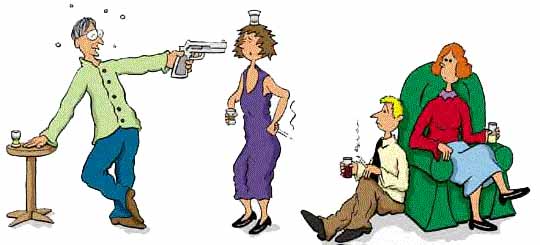
Bill begins his writing career.
With Joan and the kids out of the way, about all Bill could think about was finding more and better drugs. So when he heard that in Columbia (the country, not the university) there was a powerful hallucinogenic drug called yage (pronounced yah-hey), literally there for the picking, that sounded perfect. So he left Mexico and headed to South America.
Bill's search was documented in letters written to Allen Ginsberg and collected as the amusing and lucidly written book, "The Yage Letters". An "epistolary novel" - to quote the publishers - it shows how good Bill Burroughs could really write. Although officially co-authored with Allen Ginsberg (who later added his own letters in search of the drug), the best parts are definitely those by Burroughs.
Ultimately Bill found his yage and nearly killed himself with an overdose. As only Burroughs could, he wrote up his account of taking the oily, nauseating drink followed by the retching spasms, convulsions, and loss of consciousness as a mind-expanding experience. The trouble was he soon found that although the yage vine was readily available it took a certain finesse to properly extract the drug from the bark, and furthermore it quickly lost its potency if stored. Bill decided there wasn't much point in hanging around South America.
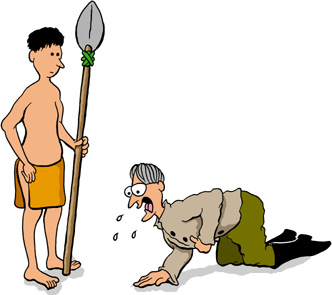
In South America, Bill underwent a mind expanding experience.
The question was where to go.
Instinctively perhaps, he traveled to New York City. There Allen Ginsberg began acting as Bill's literary agent and was able to actually find a publisher for Bill's tales of life as a drug addict. The book, titled "Junkie" and originally published under a pseudonym, appeared only in a cheap paperback edition. It made him some money, but again not enough to support his ever increasing addiction to drugs. But now, at least, Bill Burroughs was a practicing writer.
It was at this time that Bill began to get intimately involved (so to speak) with Allen Ginsberg. Actually Bill (and Joan) had recognized this tendency long before, and in the opinion of the Beats, being attracted to someone of the same gender never seemed to be much of a problem. Allen, though, had already taken up with his lifelong friend and companion, Peter Orlovksy, and when Bill wanted Allen to come with him to Tangiers where drugs and male companionship were cheap, Allen refused.
So Bill went off alone, and for the next five years - from 1953 to 1958 - he lived in Tangiers. Considering his lifestyle it's incredible he survived. Living in a commercial establishment devoted to manly togetherness and taking drugs almost continuously, he somehow was able to find time to write. He sent his efforts to Allen Ginsberg who provided constructive criticism and also continued to act as Bill's agent. Nothing, though, that Bill wrote was really in a form that could as yet be published.
The main problems was that writer or no, Bill was still a junkie. At one point he was injecting drugs every two hours. This began to seriously interfere with his ability to function, let alone, write.
Like many addicts he tried kicking the habit himself. His method was vintage Bill Burroughs. He would have a Spanish friend, known only as Kiki, hide his clothes so he couldn't go out and look for drugs. Bill, being an unconventional type, never let such a minor matter as no clothes stand in his way of anything, and at one point, his neighbors found him sitting in the hallway, stark naked and poised on a toilet seat which he had (in his own words) "ripped from its moorings". This itself raised a few eyebrows even there, especially since at the same time, he was playing in a bucket of water and lustily belting out "Deep in the Heart of Texas".
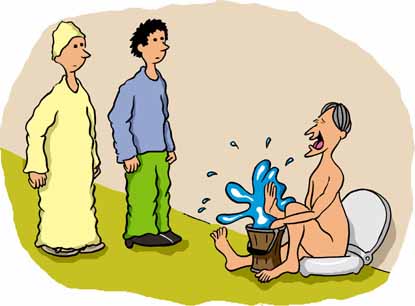
Bill's self-cure
Bill soon realized he could either be a live writer or a dead junkie, but not both. There was only one thing to do. The forty-one year old Bill Burroughs again borrowed money from his parents and flew to England which had a reasonably progressive drug treatment program.
In London, he entered into an apomorphine cure which quickly did the trick. The fact that England treated addicts as victims, rather than criminals, made a deep impression on Bill. For the rest of his life he thought criminalization of drug addiction was the stupidest thing any country could do.
Back in Tangiers, Bill was now able to focus on writing. Without the dependence on drugs what he wrote began to have some structure. Jack Kerouac, Allen Ginsberg, and Peter Orlovsky came by for a visit and helped him put his writings in some kind of coherent (for Bill) arrangement. Since Bill early on had sold his typewriter to get drug money, Jack took it upon himself to type up Bill's longhand notes and before long the novel "Naked Lunch" was more or less ready. The title seems drawn from a typical Burroughsian mental state, but as is well known it simply came about because Allen misread Bill's handwriting for "naked lust" as "naked lunch". Once more Allen took it upon himself to help find a publisher.
Tangiers, though, had begun to pall. It was cheap and the pleasures were many, but after Allen, Jack, and Peter had gone, there were only a few people with whom Bill could discuss literature. Then he got a note from Allen, saying they had moved to a hotel at 9 Git le Coeur in Paris. It was run by one heck of an old lady named Madame Rochou.
The rent, 120 francs a month, was surprisingly easy to come by. And if you were a struggling young artist, Madame Rochou sometime would accept paintings, which she usually threw away as worthless, in lieu of cash.. If you were a writer there were the small Paris presses that specialized in English language pornography. So in between creating great literature, you could rip off a few books of smut that would pay the rent.
The hotel, to put it mildly, suited the Beat Generation perfectly. Now known as "The Beat Hotel" (what else?) it could not have been more shabby and still legally be permitted to operate. It was a rundown, ramshackle place where the lights burned out, the water didn't run, the paint peeled, the heat didn't work, and the toilets were holes in the floor. Everybody loved it.
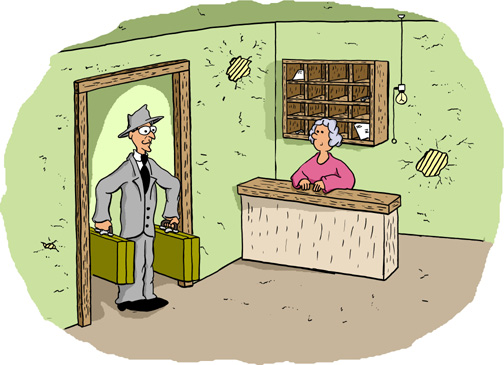
Bill arrives at the Beat Hotel.
Despite the drugs (which were prevalent), the petty thieves and crooks (who also needed a place to stay), and the weird Americans that came and went, Madame Rachou got along quite well with the authorities. The local gendarmes rarely, if ever, gave her a hard time.
In 1959, while in Paris, "Naked Lunch" (considered his masterpiece) made it into print, and when an American edition was published in 1962, it received some surprisingly good reviews. It also had the distinction of being the subject of the last major obscenity trial in the United States. Naturally, this helped the sales.
It was also in Paris, that Bill developed a friendship with artist Brion Gysin. This was not one of Bill's physically intimate relationships - such as his earlier involvements with Allen, Kiki in Tangiers, and later with the young Cambridge student Ian Sommerville. Instead Bill and Brion developed an artistic camaraderie based on mutual respect of two like minded individuals. Their friendship lasted until Brion's death in 1986, and most importantly, it was Brion who discovered what many think Bill invented: the art of the cut-ups.
Cut-ups are - as it sounds - a literary version of an artist's collage. Brion discovered it when he was cutting out matting for his pictures and the knife also sliced up the newspapers that he used to protect the table. He found when he put the resulting sentence fragments randomly together new sentences were formed. Originally it just struck Brion that the new sentences were funny, and the people in other rooms could hear him convulsed in laughter. But what intrigued Bill was that you could create totally new sentences which he felt expressed wholly undiscovered thoughts.
Burroughs detractors wonder why people would be willing to buy books that were composed of randomly constructed sentences, but Bill was quick to point out the process wasn't totally random. You selected the fragments you wanted and assembled them in the sense (?) you wanted. You could also intersperse the cut-ups with more or less conventional sentences and you got a story. An unconventional, strange, and to some totally incomprehensible story, but a story nonetheless.
The first cut-ups book was a collaboration by Bill, Brion, and the poet, Gregory Corso, all of whom looked upon the sound and appearance of the words at least as important as the meaning. They found a printer and an edition was run off. Gregory returned to poetry, and Brion went back to painting, but Bill's next three books, "The Soft Machine", "The Ticket That Exploded", and "Nova Express" all relied on cut-ups. Bill took this mode of writing seriously, even though he realized that the books were tough going for a lot of people. With new printings he tried to revise each edition to make them more readable. Fans of Bill Burroughs may think he succeeded, but Burroughs critics probably wonder why he bothered.
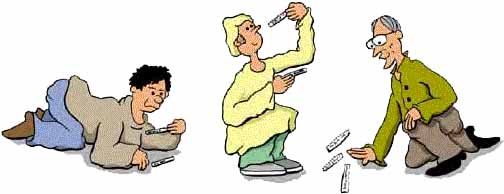
Greg, Brion, and Bill collaborate.
Living in Paris had advantages in that it brought Bill back into daily contact with the Beat crowd and their way of life. That was also its disadvantage, and soon Bill went back to drugs. He didn't hit them as hard as in his younger days - maybe once a day - but he eventually had to return to London to take another cure. By 1960 he had moved permanently to London, which if nothing else, at least, helped him cut down his travel expenses.
Bill spent more than a decade in England, from 1960 through 1973, and saw both the demise of the Beat Generation and the rise and fall of the hippie movement (although it took the 1980 election of Ronald Regan to clearly signal to everyone that the hippies were really gone). During those years Bill published more than twenty books, but because they were often by small presses (and sometimes limited or mimeographed editions) he didn't get large royalties. In fact during that period Bill's biggest yearly income was probably in 1971 when he received a $10,000 inheritance from his mother. Of all the Beats, only Jack Kerouac's "On the Road" originally made much money, and Jack was able abandon his daughter to a life on the streets while he went back to live with his mother. Even Allen Ginsberg, increasingly famous as the 60's rolled on, was by no means well-to-do and had to be careful with his spending.
London provided Bill with a lot of ideas and philosophies to ponder and write about, and at one point he became interested in L. Ron Hubbard's discipline of Scientology. Bill's writings reflected his interest, but as usual it's hard to tell what he really thought. He told Ian Sommerville that he was just "investigating" Scientology (Ian thought it was garbage), and when one of the leading Scientology gurus whispered confidentially that in a previously life he had been Rudolph Valentino, Bill's interest seems to have waned.
Bill slowly got more and more dissatisfied with London even though he could take drug rehabilitation programs as often as he pleased. A major problem was that London's pub and restaurant hours didn't fit with Bill's lifestyle, and although he had a number of friends, he didn't see them all that often. But pure inertia kept Bill in England until he got a letter from Allen Ginsberg asking him to come teach a writing course at the City College of New York. The money - $7000 - was pretty good for the time, so Bill accepted. At the beginning of 1974, he was back in New York.
Bill had returned to America after more than twenty years abroad. Although Jack Kerouac had been dead for over four years, struck down by an alcohol-induced hemorrhage while watching "The Galloping Gourmet" on television, Allen was nearby, having settled on a farm in upstate New York. Not only did he help Bill get the teaching job, but he also helped Bill arrange public readings. Bill turned out to be quite good on the lecture platform and the pay was much better than in Europe. Allen also arranged for Bill to teach writing courses at the Buddhist Naropa Institute in Boulder, Colorado which Allen had helped establish. So with his teaching and readings Bill achieved a more or less livable income.
Being back in America brought Bill back into contact with his son, William Burroughs III (known as Billy, Jr.). In general, they did not get along very well. In fact Billy, Jr. didn't get along with anyone very well, and with the exception of their abuse of drugs and alcohol, father and son didn't have much in common. Despite attempts by both Bill and Allen to help him out, Billy, Jr. later ended up as a broken down and outdated hippie wandering around Boulder, Colorado. In 1981, at age 34, he was found dead in a ditch.
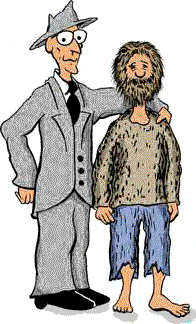
Bill and Billy, Jr.
Bill, who had never expressed a great interest in popular music, suddenly found himself something of a cult figure by some of the more far out rock-and-roll artists. David Bowie admired Bill's work and saw a kinship between his own Ziggy Stardust character and Burroughs' work. Even Bob Dylan, whose songs were more inspired by Woody Guthrie, felt Bill Burroughs was an important influence on rock. But when Yoko Ono met Bill in New York, Bill had drunk so much that day he didn't remember the visit.
It was the punk rockers of the late 70's, though, that really embraced Bill as their elder statesman The hard core punkers had taken to heroin as the ultimate in cool, and even without Bill's all around craziness, his unrepentant attitude toward drug use would have made him their hero.
Although he didn't dye his (thinning) hair purple, and he kept to his conservative business suits and fedora, Bill joined the punkers with enthusiasm. And he did go back to using heroin. Of course a sixty-five year old junkie can't keep it up like a spring chicken doper of fifty, and after two years Bill realized this was going to kill him. Fortunately, New York City had a methadone program and for the rest of his life took a daily dose.
Another problem with New York is it wasn't (and isn't) cheap. In 1981, after Bill had taught a course at Naropa, he returned to New York to find that his landlord had doubled the rent. Rather than try to argue it back down (or pay the extra cash), Bill started looking for a less expensive place to stay.
To make extra money, Bill had traveled around the country, giving readings at various colleges. He remembered that Lawrence, Kansas hadn't seemed such a bad place. It was, after all, a college town (the University of Kansas) and so would be reasonably tolerant of crazies and eccentrics. It was also close to the metropolitan Kansas City area (which had a methadone program) and a drive across Missouri would actually put Bill back to his St. Louis roots. Best of all, the real estate prices were reasonable, and once his agent negotiated a deal with a new publisher, Bill could actually afford to buy a small house. So in late 1981, Bill took up residence in Lawrence, and settled in to a comfortable, if not opulent, lifestyle.
Between 1974 and 1997, Bill published over 40 books, if you include the small press and limited editions. He did have the good fortune of having an excellent agent who handled the business end of Bill's writings, and with some extra time on his hands, Bill now began to venture into art. Some of his drawings, although certainly abstract, show real creativity and talent, and even those who don't appreciate his writings might wonder why he didn't start drawing earlier. But naturally Bill couldn't stop at that. His instinct was always for the outrageous even if it didn't seem that way to him.
So Bill invented "shotgun" art. It was exactly what it sounds like. Bill would load one of his guns not only with a shell, but pack it with pigments and then blast the canvas. Oddly enough, these canvases actually are something even the more conventional connoisseurs of modern art wouldn't mind hanging on their walls.
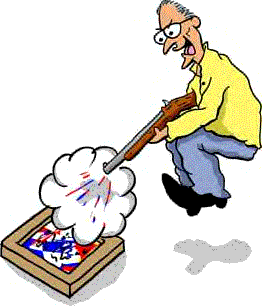
Bill the Artiste
Although Bill never had any problems with his neighbors, he didn't really go out of his way to cultivate their acquaintance. But there was one set of Lawrence residents that Bill found quite congenial and that was the neighborhood cats. One day after one of the stray animals wandered up to his house, Bill let the cat in and fed it. The cat hadn't eaten regularly for quite a while and gorged himself continuously for a quarter of an hour with its abdomen growing visibly by the minute.
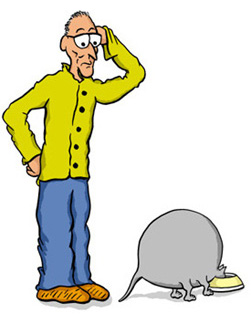
Bill and a Kansas neighbor
Bill saw the animals as individuals who were totally removed from the failings of his fellow humans, and over the next several years, Bill adopted a number of other cats. Ultimately he wrote up his doings in "The Cat Inside", a short and (for him) rather traditional book with tales that even the most staid cat fancier can appreciate.
By the 1980's (often with the active lobbying of Allen Ginsberg), literary honors began rolling Bill's way. In 1983 he was inducted into the American Academy of Arts and Letters and was even elected to l'Ordre des Arts et des Lettres in France. The last honor was a bit soured for Bill when he found out that the comedian Jerry Lewis was also a member.
Because Bill wasn't all that well known to the general public, knowing who Bill Burroughs was had acquired a certain chic, particularly around the Hollywood crowd. Soon Bill was given cameo parts in mainstream movies like "Home of the Brave", "Drugstore Cowboy", and even "Twister". He was a natural as long as he played a thin old guy with a deep and rather hollow voice. But when he appeared in Nike and GAP ads, Burroughs fans began to wonder if Bill was selling out. Bill shrugged the question off. He just needed the money.
By the 1990's and pushing toward eighty, Bill was becoming increasingly frail, although it was really a miracle he had lived as long as he did. By the summer of 1997, he had outlasted most of the original Beat writers including Allen Ginsberg. Given how many of the Beats died (as you might expect) due to alcohol (Jack Kerouac), booze-related misadventure (Neal Cassady), or liver cancer (Allen Ginsberg and Ken Kesey), Bill had to be the exception. For someone who had to be the odd man out, he went in a fairly conventional manner. On August 1, 1997, at age 83, Bill had a heart attack in his Lawrence home. He died the next day.
Return to William Burroughs Caricature